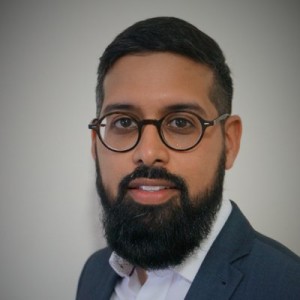
9. Dr Abdullah Mia - What’s it like to be a Muslim Clinical Psychologist working in forensic services?
 2021-02-24
2021-02-24
Do people of Muslim faith experience additional challenges in forensic services? What's it like to work in services characterised by institutional racism if you're a person of colour?
Abdullah Mia joins us in a fascinating conversation about his work, his background as a muslim whose family came from India and how this has influenced his life. As a Consultant Clinical Psychologist Abdullah has a profound influence upon the places he works. He describes his frequent encounters with racism, how he actively copes with this, confronting it when necessary. He shares his experiences of developing as a person, a practitioner and a leader. The title, 'Rely on your own heart and reason,....and divine inspiration', is a quotation from Homer that Abdullah endorses saying, 'this is as far away from British Psychology as it is possible to be'.
Abdullah Mia Biography
My personal history influences me as much as my professional history, therefore I come from a Indian Gujarati Muslim background, and was encouraged to celebrate other people’s cultures even though they were not my own ie. Christmas, Diwali etc. Here began my ‘difference is OK’ experiences, in the context of ongoing anxiety about racism as I grew up. My family also have a strong traditional element, which means hierarchies of respect entwined with patriarchal and caste based systems. This also introduced me to difference can be ‘bad’. This personal conflict has taken some time to understand and process and the way I have navigated difficult conversations with family and community also influence how I navigate hierarchies within my professional life.
My professional life has varied, beginning as teaching assistant, through to a reparation officer with YOT teams in Lancashire, and then as a youth worker. As a youth worker, I also began volunteering as an Assistant Psychologist, before a paid post in a community psychology project in Liverpool working with refugees and asylum seekers, I think unconsciously and consciously I have been always motivated to work with difference and marginalised groups, and this has contributed to me also working with offenders. Moments of reflection seem to lead me to think that it's linked with my own experiences of inhabiting multiple worlds, and navigating these stressors and joys. Since training as a clinical psychologist, I have also completed training in group analysis (but not the full analyst training!) and really like to incorporate how the social and political worlds present in our bodies and our minds. This combined with my continued in how people navigate racial and ethnic differences in the work, and how this can also give us some understanding and learning about what it means to navigate multiple spheres of life, and ultimately different conflicts.
More Episodes
Create your
podcast in
minutes
- Full-featured podcast site
- Unlimited storage and bandwidth
- Comprehensive podcast stats
- Distribute to Apple Podcasts, Spotify, and more
- Make money with your podcast
It is Free
- Privacy Policy
- Cookie Policy
- Terms of Use
- Consent Preferences
- Copyright © 2015-2024 Podbean.com






